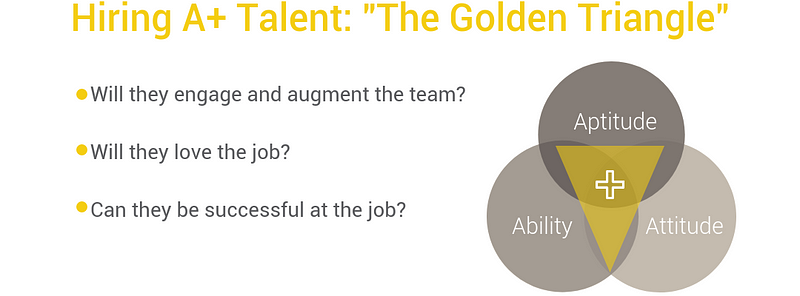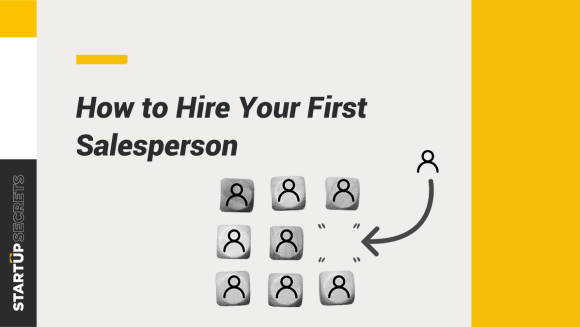People often ask me, “what has surprised you about moving from operating to venture?” While there have been many revelations about venture since making the jump, one predominant learning has been how much time we — both VCs and founders — spend focused on people and hiring.
It makes sense, as the first and foremost thing we look at when evaluating a potential investment at the earliest stages is the team (followed by market and product). With an investment lens, we consider if and how this founder and team is uniquely qualified to go after an opportunity. But we also consider:
“Will this person be able to hire a great team to execute against the vision?”
Given the importance and challenge of startup hiring, it is also not surprising that last spring during our UFirst Studio Series, a program for first-time founders, our session on hiring and culture was deemed one of the most valuable sessions.
In this session, we explored the Startup Secret’s framework for hiring and learned from the experience of the team at Salsify, Jason Purcell and Allison Churilla. This framework suggests that hiring decisions should assess Attitude, Aptitude, and Ability — in that order. Not cultural fit.

Why You Should Hire for Attitude
Attitude is a nuanced reflection of startup culture. Keith Frankel, the founder of Parlay, noted in our _UFirst Studio that “attitude” needs to be defined by the founders and is actually a reflection of company culture. It’s arguable that filtering candidates for attitude can be as simple as “good attitude” versus “bad attitude”, but it’s actually more nuanced. A person might have a great attitude, but it’s not the attitude that aligns with company culture. For example, in some companies, a ‘just do it’ attitude or a ‘done is better than perfect’ attitude is what’s prized. In other cases, a company culture might call for perfection (Apple) or an importance for bringing people along a careful process.
Avoid the perils of “culture fit.” If Attitude is a reflection of culture, the better you can define the target attitude you’re hiring for, the better you can avoid the risks of the opaque filter of “culture fit.” Without specificity, this filter is a catch-all, or a shell, which perpetuates the risky practice of “like hires like.”We like to hire people who feel comfortable. But “culture fit” can quickly become the filter that weeds out diversity in opinion and thought. So the better you can define the characteristics of culture that you are aiming to build — the better you define the attitude of the people you want in your organization — the more you can identify it upfront. Candidates with a diversity of backgrounds and thoughts can share qualities in attitude. Frances Frei goes as far to say, “In interviews, don’t look for fit, look for difference.”

How Do You Hire For Attitude?
How do you test for attitude in the hiring process? It’s hard. The process itself can help illuminate attitude — for example, if you require a work product in the process (which I highly recommend because the best way to assess if a candidate can do the job is to have them do the job), how did they approach it? How was their follow up and team engagement after the interviews? The “right” approach will vary depending on what is valued by the company, but the process will be illuminating.
Another way to evaluate for attitude can be through questions that require self-reflection. Some questions I like to use (and thanks to Allison, Head of People at Salsify for some of these good ones) include:
- “What is a difficult piece of feedback you’ve received and how did you respond?”
- “What was your most negative reference?”
- “What part of this role will be most outside your comfort zone?”
- “What feedback have you recently received and did you agree with it?”
- “Tell me about a conflict you had with a person and how did you manage it?”
- “What’s something you’re working on in yourself?”
Another alternative approach to test for attitude I recently came across is to start by simply asking the candidates what questions they have for you and let the interview go from there (this can illuminate how much research they’ve done, how they respond in an unconventional situation, and if they can be proactive and think on their feet?).
What are your favorite interview questions to test for attitude and culture? I would love to hear.
Hiring is hard, and probably the most important thing you can do right as a founder (and as VC or operator). While it’s tempting to hurry up and get the role filled so you can move on and get back to other work, there are a few catchphrases I use to remind myself to be patient:
“Hire the right person, not the person right now”
“Hire slow, fire fast”
And of course, I always try to remember that:
“An empty apartment is better than a bad tenant.”
For more insightful resources on hiring, check out:
- Startup Secrets Hiring A+ Talent
- Harry Stebbings’ 20MinuteVC with Andrew Farah on hiring for diversity
- Trends that will change recruiting and hiring!










